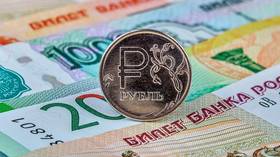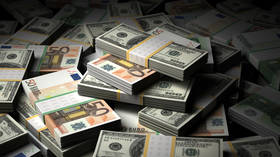
G7 members are “warming” to the idea of borrowing money against profits from seized Russian assets, the newspaper reports

FILE PHOTO © SSV-Photo / iStock / Getty Images Plus
The White House is using the risk of a potential victory for Donald Trump over Joe Biden in the US presidential election to push the G7 into using Russian assets to fund Ukraine, the Financial Times reported on Sunday.
Western nations have frozen some $300 billion in Russian sovereign assets since Moscow launched its military campaign against Ukraine in February 2022. Washington initially pushed for the outright confiscation of the money so that it could be used to cover Kiev’s needs. A number of US allies have objected, however, citing the potential damage to Western financial credibility.
Washington is now advocating a less radical scheme, under which future profits from immobilized Russian funds would be used as a guarantee for a multibillion-dollar loan. The UK and Canada back the proposal, although four other members of the G7 – France, Germany, Italy and Japan – seem reluctant, according to the report. Most of the frozen Russian assets are located in EU jurisdiction.

Read more
Western officials told the FT that the US is successfully using the threat of a Trump presidency in the November election – under which further American aid for Kiev would likely be much harder to secure – to “warm up” the doubters to the idea. If the scheme is approved during a G7 leaders’ meeting in June, the funding would supposedly be “Trump-proof.” Some $50 billion is expected to be raised for Kiev through the proposal, potentially as soon as this summer, the newspaper said.
Details of the proposed loan remain in flux, according to the report, including who would issue it, who would guarantee it, and how G7 nations would share the risk of non-payment in the event that future profits “don’t materialize.”
Moscow considers the immobilization of its funds illegal, and has warned it would retaliate against any confiscation. Russian officials have also indicated that Western investments in their country could become collateral in the stand-off.
The EU has its own plan to use profits from Russian assets to pour more money into Kiev’s war effort. Brussels is seeking to apply a windfall tax and then authorize the use of the money to buy more weapons for Ukraine. The proposal is facing potential obstruction by member states such as Hungary and Slovakia, which are skeptical of the West’s entire Ukraine policy.




